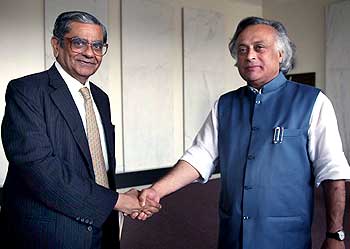"We must aim for low hanging fruit," Union Environment Minister Jairam Ramesh told an audience in New York, indicating that the control limits being sought by advanced countries were too high.
In significant comments ahead of the summit, Ramesh said India should not be singled out as the "obstructionist" and instead industrialised countries should agree on realistic targets for cutting emissions by 2020.
Text: PTI
Image: Union Environment Minister Jairam Ramesh in New York
Photographs: Jay Mandal
'Don't club India and China'
The minister said at no time, in the future, would India's per capita emissions exceed the per capita emissions of the industrialised countries. He further pointed out that while India was in the same "negotiating ship" as China, the two countries should not be clubbed together.
India has 16 per cent of the world's populations and produces less than 5 per cent of the word's greenhouse gases, China has 17 per cent of the world's population and produces 23 per cent of the world's greenhouse gases, and the United States has 5 per cent of the world's population, but produces 22 per cent of the world's greenhouse gases.
Image: Jairam Ramesh with Professor Jagdish Bhagwati at the Columbia University.
'We have lost the media battle'
"India is a climate dependent society," he said, adding India's agriculture, for instance, is heavily dependent on rain, and rainfall variations can adversely impact the country's GDP.
He mentioned that the National Action Plan on Climate Change, which has both adaptation and mitigation measures, was being vigorously implemented.
The minister asserted that India had been unfairly called a "renegade" by the international community, and the media continued to paint India unfairly.
"We have lost the media battle," he said, explaining that it was important for India to explain its position better to the rest of the world.




article